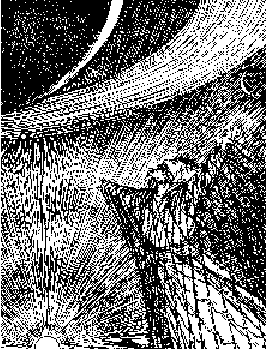the Minor Prophets
Hosea
Prophet of Love
The Pharisees had only self-righteous contempt for Jesus when they observed the company he kept. Jesus was most often found in the midst of the common people. He was also a magnet to the most desperate of humanity and the most needy. "Why eateth your Master with publicans and sinners," they asked his disciples. They had a distorted view of God which resulted in an aloofness, self-righteousness, and a disdain for others.
When Jesus heard their criticism he spoke of the sick needing the physician and then gave them spiritual homework. "go ye and learn what that meaneth, ‘I will have mercy, and not sacrifice: for I am not come to call the righteous, but sinners to repentance." (Matt. 9:13). He quoted an Old Testament passage that should have sent them to the book of Hosea to find an answer. Hosea was the prophet of love.
Prophets are most often heard as they thunder with fearsome indignation; here was a prophet with little thunder, but much rain. He cried. If Psalm 22 is the Calvary of the Old Testament, Hosea is the Gethsemene. For as Jesus cried, and agonized in the garden for the life of Israel, so Hosea tells his story with a broken heart.
Hosea lived in the Northern Kingdom which misinterpreted its material success as being the pleasure of God. The rolling chariot wheels of Assyria would soon rumble across the northern plains of Armageddon as an instrument of providence to punish arrogance and infidelity. The prophets are proof that God always warns before he punishes, and the eventual emptiness of the northern cities, as the population was lead away in chains is an historic evidence that God’s word is true.
Hosea’s story is a story of love. In it we see something of the love of God. To be sure there is much heart wrenching emotion involved for the prophet and broken-heartedness as a husband and father seeks to restore a prodigal wife and mother, but the love of the Bible is deeper than emotion. Love is an act of the will.
See a man diligent in his business, says proverbs, "he will stand before kings." Hosea must have been diligent , for he stood before many Kings. They came and went, but he was the conscience of Israel crying out in the wilderness. He stood before at least eleven, Uzziah, Jotham, Ahaz, Hezekiah, Jeroboam II, Zechariah, Shallum, Menahem, Pekahiah, Pekah, and Hoshea who was at last carried away by the Assyrians.
"Go," said God. We have no way of knowing if the following words were written before Hosea’s heart was broken or after. Perhaps he was as proud and in love with Gomer as you were the day you stood at your marriage altar. Perhaps Gomer still wore the pure white wedding gown of her innocence. Perhaps when he saw her on that wedding day, his heart leaped within him, perhaps his dreams, hopes and wishes were as wonderful and as large as yours. We don’t know.
What we do know is that God had a covenant with Israel as a man has a marriage contract with the bride of his youth. What we do know is that marriage is the most sacred of institutions, and the most fundamental of societies foundations. We are reminded in the story of Hosea and Gomer of our own vows at the marriage altar "What God hath joined together let no man put asunder."
Salvation is a sacred, holy, and eternal covenant. God has pledged himself to us with sacred promises. "I will never leave you, nor forsake you." Gomer might leave Hosea, but Hosea will never leave Gomer. As a matter of fact, even though the marriage gave birth to disappointment (Lo-ruhamah, no pity; and Lo-ammi not my people) Hosea’s love endured. Israel’s infidelity has given birth to many sad children.
But the lesson is that God keeps his word and is faithful. He promised that the blood spilled by a vengeful Jehu would be revenged. Though it took a hundred years, God’s word could not help but be so.
Marriage is a promise. Do you take this man to be your lawful wedded husband? Do you promise to keep yourself for him forsaking all others? Do you promise to honor and respect him, to love and to cherish and follow him till death desolve these sacred vows? One day, Gomer said "I do." We shall never know why Gomer wandered from her vows, nor why she broke so many hearts. We shall never know what weakness of flesh, and spirit took hold of her.
What I do know is that God loved me when I was yet in trespasses and in sins. What I do know is that I never deserved to be called by him or be the object of his love. What I do know is that in me "that is in my flesh there dwelleth no good thing." Jesus sought me when a stranger and brought me to his banqueting table. What I do know is that I was not, and am not beautiful, yet he loved me and gave himself for me.
Nothing is more tragic than to see someone forsake their marriage vows. Let him who would crown himself the innocent party look deeper. And let him who thinks the exception clause is cause enough to sever the sacred cords read Hosea and weep. Let him hear the words of Jesus, "I would have mercy and not sacrifice." Let us all wonder how God could love us so.
"Plead" said Hosea. So I plead with you this day, "be reconciled to God."These abandoned children become the victims of infidelity. They become, as so many are become today, little emissaries relegated to shuttle diplomacy, bringing messages in broken hearts. "Plead with your mother." Oh how God pleaded with Israel, and oh the shameful places God’s Word found her with her lovers, but she would not listen.
This is not a picture of the church, for the Church is yet the Virgin. This is an old Testament prophet speaking to Israel. However, individually the pleadings can be applied to many a prodigal who has become mad with unbridled arrogance, and backslidden through neglect, forgetting their first love.We need to be faithful. We need not wander away from out first love, the Lord Jesus.
"Plead with you mother," wrote the prophet. And so prophets still plead with any prodigal who is breaking God’s heart. And plead with any who are in danger of going out into eternity "Pitiless" and "Not His Children" to come in faith and be born again. Repent of your sin, and trust Jesus Christ as your only Savior and enter into an eternal covenant that God shall never break.
To understand such a love is strange to our modern mind. Likewise, hate is also an act of the will. Thus when we read the "Jacob have I loved, and Esau have I hated" we see sovereignty and not sentimentality. When the Bible says "For God so loved the world..." it is not speaking about emotion but a sovereign choice and will.
But none the less, the love of Hosea for Gomer is heart-breaking, and the lessons are eye-opening. To read of Gomer is to read the story of the prodigal daughter. "I will go after my lovers" (2:5) She did not realize that it was God who gave her corn, wine and oil (v.8). We are all in danger of biting the hand that feeds us. And like the prodigal son, we may indeed come to "want." Luke tells of the lad finally coming to his senses and realizing that things were much better at the father’s house. "I will arise and go to my father." In Hosea we read, " I will go back to my husband again; I was better off with him than I am now" (v.2: 7).
Gomer is a figure of Israel. She forgot that every good and perfect gift comes down from the Father of light’s. Israel also entered into a love affair with the world, or at least, its nations. She became unfaithful. As infidelity has cut the deepest wounds in the human heart, so God’s heart bleeds from the gaping wounds inflicted by the wantonness of his children. "Jerusalem, Jerusalem," cried Jesus as he wept over the city of David.
Like the prodigal son, Gomer had many friends while she was seemingly successful, but when her situation took a turn for the worse she found herself alone and destitute. The prodigal son "spent all" and his friends left him. God would take away everything from Israel to the extent that no one would want her. Historically this was the case, not once, but twice. The first time was when Sameria fell, the second time was when Jerusalem fell to the armies of Titus and remained a forsaken waste land for centuries until 1947. Although Israel had been the crossroads between Egypt and the Orient no one seemed interested in her parched and blowing sands until the Jews of the disporia returned to make the desert blossom like a rose, but that is getting too far ahead of the immediate story.
"Therefore I will take back my corn at the harvest and my new wine at the vintage, and I will take away the wool and the flax which I gave her to cover her naked body, I will show
her up for the lewd thing she is, and no lover will want to steal her from me." (vs 2:9-10). Beauty can be an awful curse when it attracts temptation like ointment does flies. The rich and powerful likewise have many (false) friends. The lesson of drought and famine had to be learned and relearned from generation to generation. Again and again God’s people have been heard to say "It is good for me that I have been afflicted; that I might learn thy statutes." (Ps. 119:71).
"I will give her ... the valley of Achor for a door of hope" (2:15)
Achor means "trouble." Many a saint can testify that the valley of trouble became a door of hope. Some sickness, some sorrow, some tragedy or defeat became the ashes from which victory would arise. Are you in the valley of Achor? Look for the door of hope. Has God allowed some pain? There is a sacred portal hidden in that wilderness, step up to that threshold and pass through.
Hosea’s story is full of grace. Even though Gomer is despicable in conduct and corrupt in character God is merciful in compassion. "I will block her road with thorn-bushes and obstruct her path with a wall" (v. 6). Some seem to be on good ground when they encourage husbands and fathers to "pray a hedge of thorns" around those exposed to danger or prone to wander. Better that a son should prick his finger while reaching for some worldly rose and recoil in pain for a moment, than to be in a coffin covered with flowers a spiritual corpse dead in trespasses and in sins. Wesley wrote a song for the church about the church, "prone to wander, Lord I feel it prone to leave the God I love." What a horrible tendency and what a legacy. There is some of Gomer in every one of us. Pray that the needles will be sharp enough to keep us from pushing through the thicket, but realize that a seared conscience feels no pain. Grace will build a wall and a way, but grace will not keep Eve from taking the fruit if she pulls hard enough upon the branch.
Gomer was drawn into physical, emotional, and spiritual waywardness. She would be punished for her wanton pilgrimages and new moon practices and un-holy days. The timepiece of the heavens moved with flaming orbs and awesome lights. One of the balance wheels in this heavenly clock was the moon. It was the first sun dial and traces the shadow of the earth upon its surface. It is not without significance that the woman’s menstrual cycle mimics the lunar one and unholy religions employed priestesses in unseemly rituals. Whether she was so engaged when Hosea first set eyes on her, or if she was later led astray by her unfaithful heart has been the subject of speculation for ages. Our curiosity misses the point of the story, for Hosea did what God asked and his broken heart would teach us the meaning of mercy if we are willing to learn.
If Hosea could forgive Gomer, who can we not forgive? Hosea is the classic example of using the tragedy of domestic disappointment and the pain of personal experience as a pulpit to proclaim a redemptive message of Grace. God does not promise we will escape misery, but that He can transform it.The fact that he married Gomer with or without knowing of her moral deficiencies is not
as important as the fidelity of his love for her. Most who read the story of Hosea stumble over the strange nuptial agreement. Did this man of God knowingly yoke himself with a soiled soul? Was Gomer deceptive? Was Hosea naive? Such curiosity is a waste for it confines us to examining the shallows when God wants us to launch out into the deep.
When life seems to have dealt us a loosing hand we have several options. We can become bitter, small, and callous, or we can use each disappointment as a vehicle to carry the message of God’s grace to others. Hosea has a life’s message that made beauty from ashes. The sensitive soul can find a sermon in every disappointment and discover gold in every mountain of trouble. The Apostle Paul understood this call to grace when he said "Most gladly, therefore, will I rather glory in my infirmities, that the power of Christ may rest upon me."
Hosea had a prophetic message for Israel, but he also has a message for us today. One addresses a particular problem, the other expresses a principle. One is for time the other is for eternity. Each of us has our own disappointments. Each of us has seen some hope, dream, or expectation become sick and perhaps even die. We might have even sent word to Jesus like Mary and Martha only to find that He did not come in time. It could be that from the depths of the sepulcher of sorrow grace calls forth glory. Then when some tragedy turns to triumph, men know and praise God.
Message to God’s People
"Plead with your mother" God wants his people back. God wants backsliders and prodigals to come home. God employs every means and endures every indignity while proving his love. Every sin has its consequence and Israel like Gomer will drink bitter waters and earn many sorrows, yet God loves us still.
Jesus would cry in his own day "Jerusalem, Jerusalem, how often I would have gathered thee. But you would not." Later too, John would pen the sad words to a Church and a people he once pastored, "you have lost you first love." Good preaching touches the heart of the prodigal who will respond as God would desire "Then shall she say, I will go and return to my first husband ; for then was it better with me than now" (Hos. 3:7b, Lk 15:17)
The Message to Preachers
"Go, love..." The preacher or teacher of God’s Word is on an errand of love. The message of the Gospel begins with a message of love. "God so loved the world that he gave his only begotten Son ..." Paul said it well when he wrote "Though I speak with the tongues of men and of angels, and have not love, I am become as sounding brass, or a tinkling cymbal. And though I have the gift of prophecy, and understand all mysteries, and all knowledge, and though I have all faith, so that I could remove mountains, and have not love, I am nothing . And though I bestow all my goods to feed the poor, and though I give my body to be burned, and have not love, it profiteth me nothing"(Cor 13:1-3). If Hosea teaches the preacher anything, he teaches the necessity of love. No Bible teacher can accomplish anything of spiritual value without love. No Sunday School teacher can make a lasting impact, or effect a positive change in the lives of his students without love. Love never fails.
Hosea teaches us about the love of God and love for God. Love is a covenant and a choice. God does not stop payment on his checks. Israel gave God every excuse to dissolve his contract with them. Although broken hearted, love keeps its vows. Marriage is an indissoluble life-relationship and used as an example of God’s fidelity. "Husbands, love your wives even as Christ loved the church and gave himself for it."
A man is well on his way to being a great preacher and teacher if he takes his Bible in hand and the world in heart, heeding the instructions of God "Go, love...."


